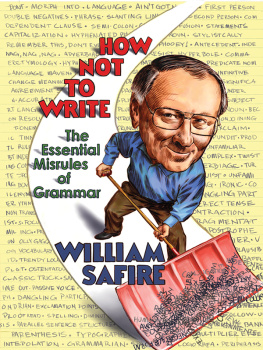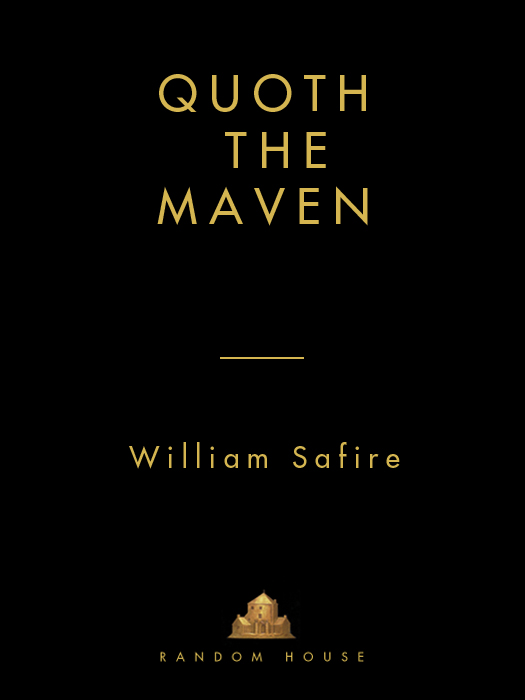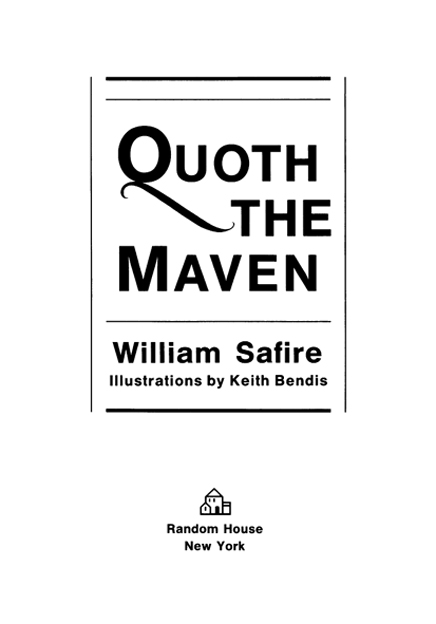Copyright 1993 by The Cobbett Corporation
All rights reserved under International and Pan-American Copyright Conventions. Published in the United States by Random House, Inc., New York and simultaneously in Canada by Random House of Canada Limited, Toronto.
Grateful acknowledgment is made to The New York Times for permission to reprint 75 On Language columns by William Safire, published in The New York Times between April 3, 1988, and December 31, 1989.
Copyright 1988, 1989 by The New York Times Company.
Reprinted by permission.
Illustrations by Keith Bendis
Library of Congress Cataloging-in-Publication Data
Safire, William
Quoth the maven / William Safire.1st ed.
p. cm.
A collection of the authors weekly columns On language
from The New York Times Magazine.
eISBN: 978-0-307-79974-6
1. English languageUsage. 2. English languageStyle.
I. Title.
PE1421.S233 1993
428dc20 92-34206
v3.1
Contents
CREDITS
Acknowledgments is a word that, to me, connotes grudging admission of the need to say thanks, or a sneaky way to avert charges of plagiarism, or a regal wave from a limousine window. Besides, the snooty word has a fake Latin prefix; hell with it.
What follows are credits to people who support my work either because they want to or because they must. Among them are the leading lexies: Fred Mish of Merriam-Webster and Sol Steinmetz of Random House, on the descriptive side, and Anne Soukhanov of the American Heritage Dictionary, who is a tad more prescriptive. For current etymology (an oxymoron), Im often indebted to John Algeo and Cynthia Barnhart, who head the Phrasedick Brigade, as well as James D. McCawley on grammar and Robert L. Chapman and Richard A. Spears on slang.
The quotation anthologist Len Safir, my late brother, knocked himself out tracking obscure quotes on my behalf; Justin Kaplan of Bartletts Familiar Quotations is also a valuable resource. Jeanne Smith at the Library of Congress does more for the taxpayers than any research aide in Washington. At Random House, where this compilation is produced, I am indebted to Kate Medina, Jonathan Karp, Camille Capozzi, Beth Pearson, Margaret Wimberger, and Patricia Abdale.
At the New York Times bureau in Washington, D.C., I am propped up by Jeffrey McQuain, destined to be general editor of the next edition of Safires Political Dictionary. New York Times Magazine editors Warren Hoge and (since 1993) Jack Rosenthal, Harvey Shapiro, and Michael Molyneux stand resolutely at the dividing line between with-it coverage of slang and the limits of good taste. The copy editors of my political column, Steve Pickering and Linda Cohen, often contribute useful ideas for my language column as they save me from countless embarressments (thats not how you spell embarrass); our chief librarian, Barclay Walsh, and librarians Monica Borkowski and Marjorie Goldsborough are more than helpful, for which I reciprocate by never using the word morgue. Ann Elise Rubin, my assistant, and Rebecca Lawrence keep me in touch with the Lexicographic Irregulars, whofrom the eyries of the Poetic Allusion Watch to the heights of glee reached by the Gotcha! Gangempower my prose and enliven my life.
INTRODUCTION
This is a book that draws together some seventy-five columns that appear under the heading On Language in The New York Times Magazine, enlivened with emendations, corrections and objections from members of a far-flung group of language lovers called the Lexicographic Irregulars. Before presenting this book to the reader, the author must ask himself: What am I?
Not Who am I?a sense of self is not a problem with mebut What am I? What is my role in this writer-reader communications symbiosis, and how do I properly explain my calling in an instant, without going into a labored job description?
The language has developed a way to signal a persons position. It has been hailed as a time-saving device and derogated as bogus titling. Let us, at the outset, examine this shorthand identifier and reach a conclusion about its use, thereby illustrating the approach to language throughout this book.
Ready? The language maven William Safire is about to take a stand in the controversy over bogus titling.
Why does the previous sentence begin with the word the? Because if it started with the words language maven, that would be construed as a title, and the style arbiters of the best publications have long said its bad form to throw false titles around.
But if I had dared to write Language Maven William Safire, without the the, would I have been trying to give myself airs? Of course not; if I wanted to assume a title, Id have tried Lord Safire, which sounds grander than anything we have in the language dodge.
The purpose of the noun phrase used attributively before the name is not to confer rank but to help the reader recognize the subject. The controversy centers on this: Should the identification of the subject be placed after the name, to be in gentle apposition, or before the name, to be fused tightly to it?
Apposition uses two nouns in succession to refer to the same thing. BillClinton, the President is an example; the second noun repeats the meaning of the first. However, when you adopt the loyal apposition, you seem to be saying something else as well: Not Bill Clinton, the haberdasher down the street who objects to being confused with the famous Bill Clinton. With a famous person, the repetition in apposition is unnecessary.
Just to avoid the problem of bogus titling, the stylebooks create the problem of conferring too much renown. The can be a powerful isolator, especially in print, where no emphasis in pronunciation is shown: Safire, the language maven suggests that I am the one and only language maven, and the legions of the Gotcha! Gang are ready to hoot at that thought. On the other hand, a is a relentless equalizer: Safire, a language maven is a put-down, suggesting that I am an anonymous crank and nobody at all knows my attempts to free mankind from the clutches of obsolete stylebooks.
When the is too singular and a or an is too general, youve run out of articles; the vocabulary bin is empty. What to do? Our resilient language scrambles around for a way out, and as always, the lingo will prevail.
The answer of usage: Take that appositive identifier following the name and stick it up front without any article at all. Voil: Language maven Safire. Neither a big shot nor a pipsqueak; just right.
Because this encapsulation of reputation was pioneered by journalists, my fellow grammarians have sniffed at it as journalesea sorry trade of inelegance for the sake of compression. But we are not merely saving three spaces on a tight line or, in Garrick Utleys case of the beating of motorist Rodney King, a whole second; consider the differentiation value of the front-end identifier in the case of three people.
James Jones wrote From Here to Eternity (a title taken from The Whiffenpoof Song). Another James Jones, known better as Jim, led a cult to mass suicide. And James Earl Jones is the actor who was the voice of Darth Vader and who announces the station breaks of CNN.
Not only does









